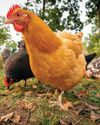
Much is written on hatching your own chickens. Whether you opt for pure breeds or cross breeds, it is a truly wonderful experience. In fact, the crossbreds can be much more exciting because you never really know what you’re going to get; you might just produce something quite unique to you. In either case, most of us hope that nature will be kind and not give us too many cockerels, and perhaps quite obviously the pure breeds are much easier to move on than crossbred cockerels, despite how beautiful they may look.
When it comes to having tame growers, as you might imagine, theories vary. Some people think that rearing chicks under a heat lamp makes for tamer chicks than those reared under a broody hen. But many factors are at play, including breed temperament, individual strains, the amount of time spent handling by the poultry keeper and so on.
If you bought in your hatching eggs, then research should have been carried out on the strain and breeder’s history. The reason many top exhibitors don’t like selling hatching eggs is because they fear that ‘the superstar they’ve been dreaming of producing’ might be in one of them. There are different schools of thought on the ethics of this. Some people believe it’s quite a sad and selfish approach, but then others would no doubt question giving away cheaply the kind of stock in which they’ve invested decades. One thing is clear in the current climate, and that’s that hatching eggs have become more readily available from top exhibitors who don’t want to waste them, and who have realised the importance of keeping these precious strains going.
This story is from the {{IssueName}} edition of {{MagazineName}}.
Start your 7-day Magzter GOLD free trial to access thousands of curated premium stories, and 9,000+ magazines and newspapers.
Already a subscriber ? Sign In
This story is from the {{IssueName}} edition of {{MagazineName}}.
Start your 7-day Magzter GOLD free trial to access thousands of curated premium stories, and 9,000+ magazines and newspapers.
Already a subscriber? Sign In

How to Buy a Smallholding in France- Long-time smallholder Lorraine Turnbull looks at the practicalities of moving to rural France
Aspiring smallholders are continually thwarted by the prices of smallholdings and property with land located within the UK. Even the humblest croft in Scotland comes with a substantial price tag and conditions which would make even an adventurous wannabee consider carefully. But all is not lost. For those willing to take the adventure of a lifetime, there is always Europe, and one of the most popular places is France.

Meet the Bournemouth goats and their supporters
These capricious animals are hard workers preserving the natural habitat

Still warm enough to sit outside with a Pizza
Henrietta Balcon uses fresh figs to create an unusual dish at Harvest time

Goodbye to the birds of spring and summer
If you look and listen you might be able to see them preparing to leave says The RSPB

Get ready for the colder weather in the warmth of late summer
Claire Waring advises on doing the best to make sure your colonies survive until next spring

Preparing the Veg Patch for Winter
Lee Senior says, a well-run plot can excitingly continue to produce good quality, tasty, fresh food for much of winter

Time to prepare to plant your orchard
Wade Muggleton, smallholder and author of The Orchard Book, shares his practical experience so you can create your own fruit collection

Choosing feed for the autumn
As autumn approaches, Joanna Palmer, nutritionist at the Smallholder Range, offers advice on choosing the right feed to support your adult birds through their annual moult and ensure your young birds grow and finish well at this time of the year.

Vet advice from an experienced poultry vet
Reflecting on how much the humble hen has helped people world wide plus advice on stopping the scourge of red mite

Give your hens some support
Paul Donovan looks at the right and wrong ways of handling birds